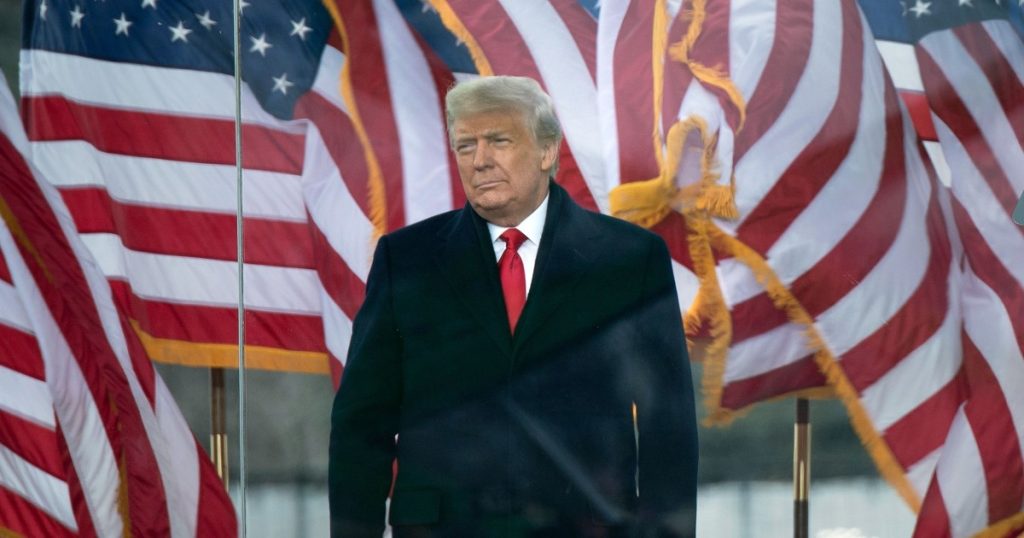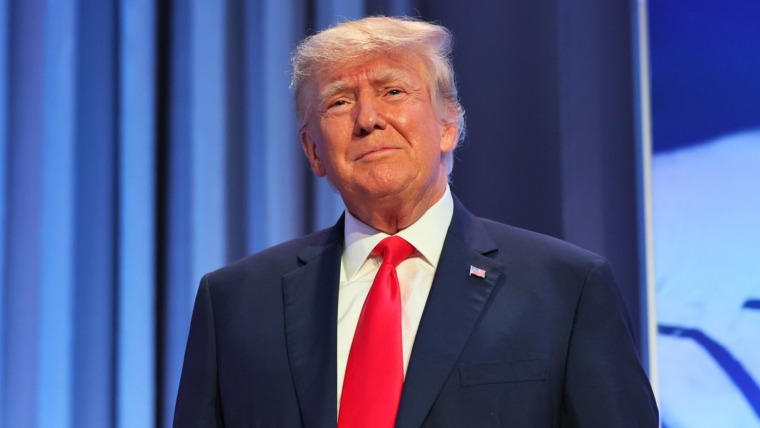
WASHINGTON — Federal grand jurors probing Donald Trump’s attempts to stop the transfer of presidential power after his 2020 election loss have heard testimony from dozens of witnesses in a wide-ranging investigation that has examined the former president’s conduct spanning the time from before Election Day through the Jan. 6 attack on the U.S. Capitol, an NBC News analysis found.
Special counsel Jack Smith, appointed by Attorney General Merrick Garland in November to oversee the investigations into Trump’s handling of classified documents and his efforts to stay in power, has led a sprawling investigation in the almost eight months since.
While a grand jury in Miami indicted Trump on 37 counts on seven federal charges in early June in connection with the documents investigation and alleged efforts to obstruct it, a federal grand jury in Washington has continued to meet on the third floor of the E. Barrett Prettyman U.S. Courthouse in the 2020 election inquiry.
Smith was charged with investigating any violations of the law in connection with efforts to “interfere with the lawful transfer of power following the 2020 presidential election or the certification of the Electoral College vote” on Jan. 6, “as well as any matters that arose or might arise directly from this investigation.”
Bringing charges against Trump in connection with his speech at the Ellipse before the Capitol attack on Jan. 6 was always going to pose a challenge. Trump’s words are protected by the First Amendment, and his rhetoric — telling the people in the crowd they were “not going to have a country anymore” if they didn’t “fight like hell” — could fit within the realm of heated political rhetoric. Trump also explicitly told the crowd to march “peacefully,” which would make charges even more difficult.
Instead, Smith’s team has investigated areas where there might be a clearer instance of potentially illegal conduct. The witnesses called indicate that the special counsel probe has focused particularly on the “fake electors“ scheme in which false slates of electors from states Trump lost would assert that he won. In total, 84 fake electors in seven swing states signed documents falsely declaring Trump the winner.
Reporters and producers regularly camp out in the courthouse lobby, watching the staircase and the elevators, trying to spot witnesses entering the grand jury area. Over the course of several months, the Washington residents sitting on the grand jury have heard testimony from witnesses ranging from little-known campaign aides to Secret Service agents to the former vice president of the United States.
Mike Pence, the highest profile witness to appear before the grand jury, testified in late April after a court order to comply, NBC News reported, just over a month before he announced he was challenging Trump for president in 2024. Two of Pence’s aides who were with him at the Capitol on Jan. 6 also testified before a grand jury last summer, before Smith’s appointment. Pence’s former chief of staff Marc Short appeared in July 2022, according to a source familiar with his testimony, and several news outlets reported that Greg Jacob, Pence’s counsel, testified as well; he declined to comment.
Earlier this month, NBC News reported that two of the “fake electors” appeared before the Washington grand jury; their testimony came the same day that Trump made his first court appearance in Miami.
Gary Michael Brown, the former deputy director of Election Day operations for the Trump campaign, also testified before the federal grand jury on June 22 and declined to comment to NBC News outside the courthouse. The Jan. 6 committee said last year it had found evidence that Brown was “aware of, and participated in, efforts to promote unsupported allegations of fraud in the November 2020 Presidential election and encourage state legislators to alter the outcome of the November 2020 election by, among other things, appointing alternate slates of electors to send competing electoral votes to the United States Congress.” The committee obtained a text message Brown sent to other Trump campaign officials after he delivered the fake votes to Congress the day before the Jan. 6 attack, which included a selfie of him in front of the Capitol.
The investigation began in earnest last year, around the time federal law enforcement officials with the Justice Department’s Inspector General’s Office searched the home of Jeffrey Clark, a former DOJ official whom Trump considered making the acting attorney general despite his lack of any experience in criminal law. Court documents revealed that agents were at Clark’s home investigating potential charges of making false statements, criminal conspiracy and obstruction of justice.
Federal agents also seized phones from four key promoters of Trump’s stolen election claims: MyPillow CEO Mike Lindell, who had his phone seized in a Hardee’s drive-thru; John Eastman, the Trump-aligned lawyer who pushed the discredited theory that Pence had the power to refuse to certify the election; Boris Epshteyn, a longtime Trump adviser who was part of Trump lawyer Rudy Giuliani’s legal efforts to overturn the election results; and Rep. Scott Perry, R-Pa., who helped connect the White House with Clark.
In September 2022, before Smith took over the investigation, the Justice Department issued about 40 subpoenas, including to former New York City Police Commissioner Bernard Kerik, who also worked with Giuliani’s legal team, and Epshteyn, who recently met with the special counsel for two days, ABC News reported, citing sources familiar with the matter. Epshteyn did not respond to a request for comment on his reported appearance.
After Smith took over in November, his team subpoenaed officials in Michigan, Wisconsin, Arizona and Pennsylvania, asking them for communications with or involving Trump, his campaign and 19 Trump associates, including Eastman, Giuliani, Justin Clark, Sidney Powell, and Jenna Ellis.
Giuliani spoke with members of Smith’s special counsel team in recent weeks, as CNN first reported. Robert Costello, Giuliani’s attorney, did not respond to NBC News’ request for comment, but a spokesman, Ted Goodman, confirmed that Giuliani and Costello had met with Smith’s team on an “entirely voluntary” basis.
Other individuals who have testified before the federal grand jury investigating Jan. 6 and efforts to stop the peaceful transfer of power include:
- Former White House lawyers Patrick Philbin and Pat Cipollone, who were scheduled to testify in September and were spotted at the courthouse in December. Both men testified before the Jan. 6 committee, saying they had opposed Eastman’s plan to have Pence refuse to certify the election because it was not legal.
- Former Trump White House officials Stephen Miller and Dan Scavino, who was seen leaving the courthouse on May 2.
- Former Department of Homeland Security official Ken Cuccinelli, who told NBC News he had testified, and former Director of National Intelligence John Ratcliffe, according to an ABC News article that cited sources familiar with the matter. A Ratcliffe spokesperson did not respond to a request for comment seeking to confirm Racliffe’s appearance before the grand jury.
- “Stop the Steal” leader Ali Alexander, whose group organized the rally that preceded the Capitol attack on Jan. 6. Alexander confirmed on social media last June that he’d testified before a federal grand jury.
- Former Republican Speaker of the House Newt Gingrich, according to CNN. Gingrich, who suggested in an email cited by the Jan. 6 committee that Trump could encourage Republican-led legislatures to refuse to send electors to certify his loss, did not respond to NBC News’ request for comment.
- Steve Bannon, who was found guilty of two counts of contempt of Congress last year and sentenced to four months in federal prison, received a grand jury subpoena for testimony and documents in late May.
- About half a dozen Secret Service agents, who also testified before the federal grand jury, according to two sources familiar with their testimony.
- Former Arizona House Speaker Rusty Bowers, a Republican who testified before the Jan. 6 committee about his refusal to back the fake electors scheme, has spoken with federal prosecutors. The special counsel also subpoenaed the Arizona secretary of state’s office.
- Georgia Secretary of State Brad Raffensperger, whom Trump asked to just “find 11,780 votes.” Raffensperger spoke with investigators from Smith’s office on June 28.
Time is of the essence. Any indictment to grow out of such a wide-ranging probe would be complex, and the 2024 Republican presidential primary is well underway.
Daniel Barnes, Diana Paulsen , Laura Jarrett and Garrett Haake contributed.
 Latest Breaking News Online News Portal
Latest Breaking News Online News Portal







